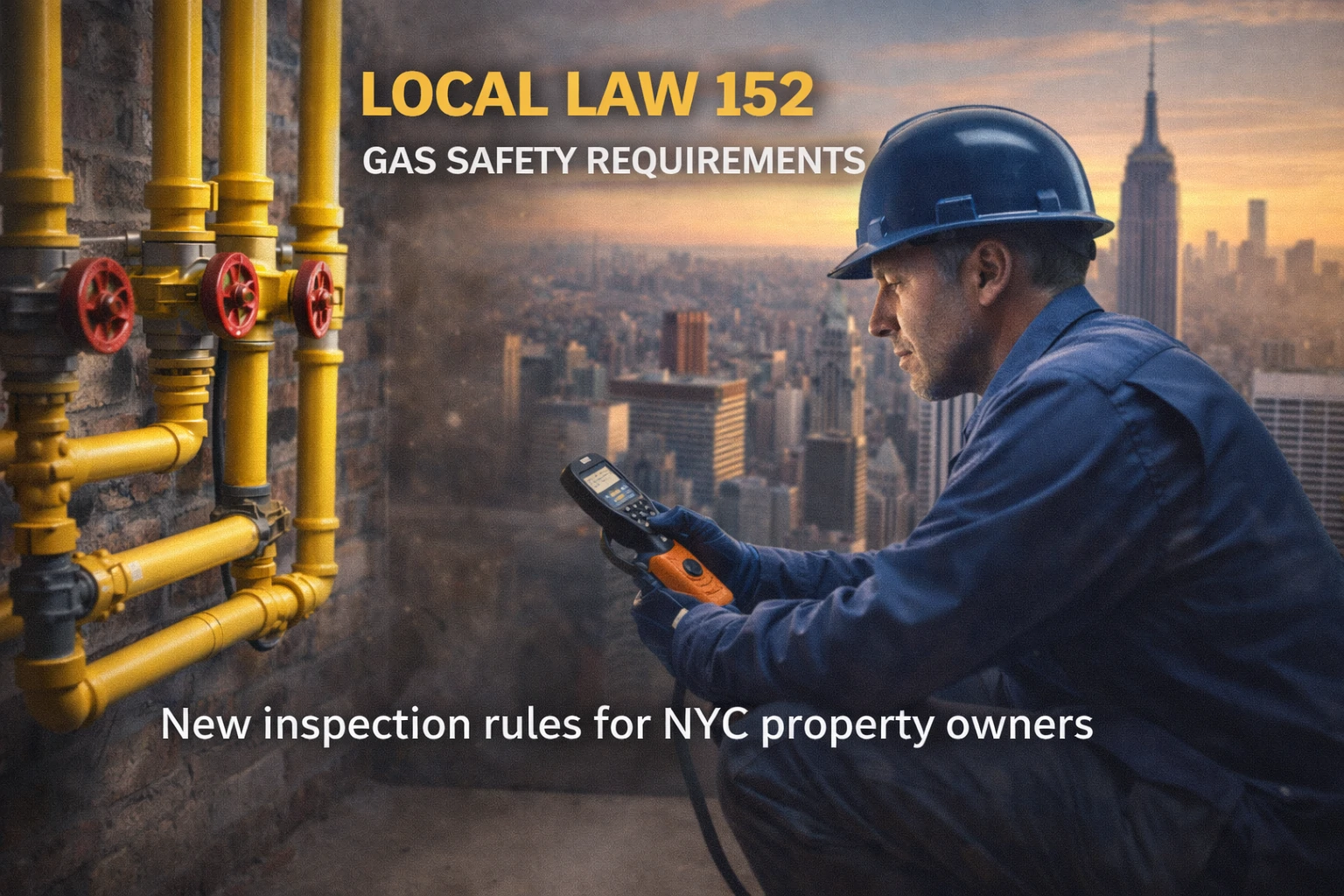New York City has strong building codes to protect people. These laws aim to prevent danger before it happens. One important rule is Local Law 152. This law deals with gas line safety. It became active after several gas-related disasters shocked the city. These tragic events took lives and destroyed homes.
City leaders passed the law in 2016. They wanted to make sure property owners checked their gas lines often. Before this law, many gas systems in older buildings went unchecked for years. That allowed leaks and other risks to grow without notice. Some of these problems led to deadly explosions.
Now, the law requires regular gas pipe inspections. These checks must happen every four years. Licensed plumbers carry out the inspections. Owners cannot skip this process or do it themselves. The city wants to catch any gas hazard before it becomes serious.
Many owners feel confused about how this law works. Some do not know when to act or what steps to take. This article gives a simple guide. You will learn what Local Law 152 is, who must follow it, and what to expect during inspection. You will also learn how to stay on schedule and avoid costly penalties.
What Is Local Law 152?
Local Law 152 is a gas inspection rule in New York City. It applies to buildings with gas piping systems. The law requires building owners to hire licensed plumbers. These plumbers must inspect gas pipes once every four years. The goal is to prevent gas leaks, fire, and explosion.
This law came from a push to improve safety after deadly gas incidents. City officials wanted to make sure no building had hidden gas risks. They chose a system that checks pipes on a regular schedule. This way, problems get caught before they grow worse.
The Department of Buildings (DOB) manages this law. It sets the standards and reviews all inspection reports. Property owners must follow the DOB process closely. If they miss deadlines or file wrong forms, they face big fines. This law is serious and must be followed in full.
Buildings Covered Under the Law
Local Law 152 covers most buildings in New York City. Any property that uses a gas piping system must follow the rule. This includes homes, apartment buildings, stores, offices, and mixed-use properties. It does not matter if the building is large or small. If it uses gas, it must get inspected.
A few buildings are exempt. If your building has no gas lines at all, it does not need a full inspection. But that does not mean you can skip action. You still must file paperwork that proves there is no gas piping. The city does not accept word-of-mouth claims. It needs an official statement from a licensed plumber or engineer.
Owners of co-op and condo buildings must also comply. They cannot ignore the rule just because the property looks safe. The city treats all buildings the same under this law. Every owner must prove gas safety through inspection or certified paperwork.
Owners who manage legal or financial matters online can learn more through the Turnbull Law Group log in guide.
Four-Year Inspection Schedule
Gas pipe inspections must take place every four years. The city split buildings into different groups using community district numbers. Each group has a set inspection year. This spread-out plan helps manage the workload and keeps inspections running smoothly.
To check your schedule, you must look up your building’s community district. Then you match it with the inspection year on the DOB’s list. This shows when your building’s gas pipes must be inspected. The cycle repeats every four years after the first check.
Deadlines are strict. If you miss your due year, you could face a penalty. Owners must plan early. Plumbers get busy close to deadlines. Waiting too long could make it hard to find someone qualified. Early action avoids stress and gives time to fix any problems found during inspection.
Filing Reports and Next Steps
A licensed master plumber does the gas pipe check. This expert reviews all visible gas lines. These include pipes in the basement, boiler room, rooftop, and hallways. The plumber looks for rust, cracks, loose joints, or anything that breaks the city’s safety rules.
The plumber may use tools to find hidden leaks. They also check if pipes have proper support. If something looks unsafe, it gets noted in the report. Every flaw, even small ones, must go on the record.
Once the check is done, the plumber prepares a report. The building owner gets a copy. The Department of Buildings receives one too. The report shows if the system is safe or needs repairs. If it passes, no further steps are needed. If it fails, the owner must fix all issues and submit proof.
What Happens After the Inspection?
After the plumber completes the check, the next step is filing forms. The main document is called the Gas Piping System Periodic Inspection Certification (GPS2). This proves that a licensed professional inspected the gas lines. Owners must submit the form within 60 days of the inspection date.
If the plumber finds no issues, the GPS2 form marks the system as safe. The owner can then relax until the next four-year cycle. If problems show up, the owner has 120 days to fix them. They must then submit another form to confirm the repair. In urgent cases, the repair time may be shorter.
Property owners should save all documents related to the inspection. These include the plumber’s report, forms, receipts, and repair records. Keeping clean records helps if questions arise later. It also protects the owner during property sales, loan approvals, or legal claims.
Fines and Legal Consequences
The city takes Local Law 152 seriously. Owners who miss deadlines or fail to file forms can face large fines. The most common penalty is $10,000 per violation. That can damage a building’s budget quickly.
A missed inspection can also lead to delays in other city approvals. A building may not get permits for renovation or refinance. It could also affect insurance coverage. Some insurers ask for gas safety proof before they issue or renew policies.
Legal trouble may follow if an unsafe gas system causes harm. In a worst-case scenario, an explosion could lead to lawsuits. A smart owner avoids that risk through regular inspection and fast repair. The cost of staying compliant is always less than the cost of failing the law.
How to Prepare for Inspection
Owners must plan ahead. Last-minute action leads to stress and high costs. The smart choice is to book the inspection months before the deadline. Early booking gives time to find a skilled plumber and handle any repairs without pressure.
A basic check can help before the real inspection. Owners or staff should look at gas pipes closely. Signs like rust, loose parts, or odd smells could mean trouble. If anything looks unsafe, fix it right away.
Keeping records also matters. Save past reports, city forms, and plumber contacts in one place. This helps future inspections run smoothly. It also proves the owner takes building safety seriously.
Some property disputes may also involve personal conflicts, as explained in our Homewrecker Law article.
Frequent Problems Found
Many inspections uncover small but serious problems. These include broken pipe supports, signs of rust, or missing shut-off tags. Some systems have unapproved repairs or leaks hidden behind walls. These flaws can turn into danger fast.
Some buildings also fail due to changes made without permits. Illegal pipe work can get flagged and lead to heavy penalties. Even a blocked gas meter or damaged vent can count as a violation. The plumber must report all problems found, no matter how minor they look.
Owners must fix everything on the report. The city does not allow partial repairs. All unsafe conditions must be corrected and certified. Ignoring small issues now may create bigger ones later.
Why Local Law 152 Matters
Local Law 152 helps keep people safe. Gas leaks can kill. They often happen without warning. In the past, blasts from leaks destroyed homes and ended lives. These events led city leaders to create stronger rules.
The law makes owners check gas lines often. It puts safety first. A safe gas system protects tenants, workers, and visitors. It also lowers the risk of fires and costly damage.
Owners who follow this law show care and responsibility. It builds trust with renters. It also helps keep the building’s value strong. Safety is not just a rule, it is a duty to everyone in the space.
Conclusion
Local Law 152 may feel strict, but it exists for a good reason. It keeps buildings safe. It protects lives. It pushes owners to stay alert and take action before trouble starts.
This law covers most buildings in New York City. It requires gas pipe inspections every four years. It demands clear records, licensed plumbers, and proper repairs. Owners who follow the steps avoid fines and reduce risk.
Skipping an inspection is not worth the danger. A small leak can turn into a deadly blast. Regular checks stop that from happening. Staying compliant is not just about avoiding punishment. It is about building a safer city for everyone.
If you own a building with gas lines in New York City, do not wait. Find your inspection year. Hire a licensed plumber. File the right forms. Take charge of your building’s safety. Your action could save lives.
Local Law 152: Quick FAQ
Q. Who can inspect my building under Local Law 152?
Only a licensed master plumber or someone working directly under one can inspect your gas system. The city does not accept reports from general workers or unlicensed staff.
Q. Does the law apply to a building with no gas service?
If your building has no gas piping, it still must file a special form. This proves there are no gas lines inside. The city must get that form to mark your building as exempt.
Q. What happens if I miss my inspection year?
Missing your scheduled inspection can lead to a fine of $10,000. The city will not accept late excuses. You should always act early to avoid penalties and avoid gas shut-off.
Q. Where do I find my building’s inspection schedule?
The Department of Buildings website lists the inspection cycle. You must look up your building’s community district number and follow the year linked to that group.
Q. Can I use the same plumber every cycle?
You can hire the same licensed master plumber if they stay active and qualified. Many owners stick with one plumber to keep records easy and build trust.
Disclaimer:
This article is for general information only. It does not provide legal advice. Always consult a licensed attorney or certified professional for help with Local Law 152 or any building compliance matters in New York City. Law and rules may change over time.



